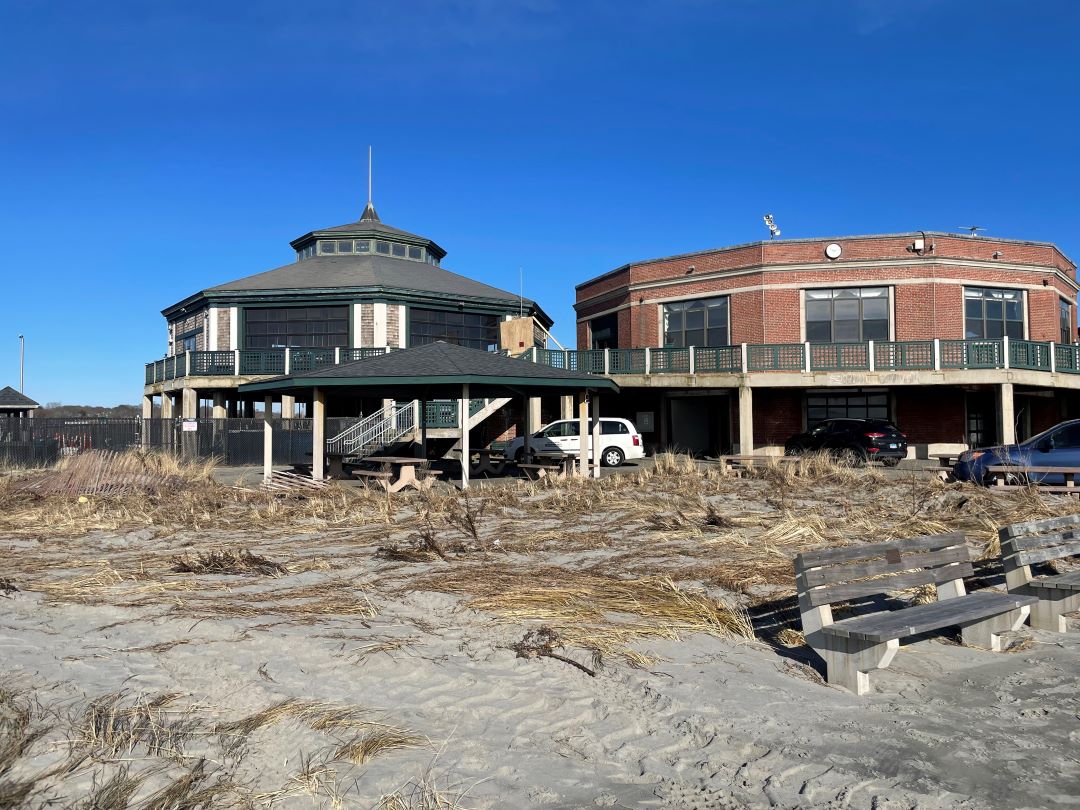New Providence Partnership Pushes for Climate-Ready City
November 4, 2021
PROVIDENCE — The city’s vulnerabilities to the climate crisis, most notably increased flooding linked to sea-level rise, storm surge, and more frequent and intense rains, are urgent and will increase in the coming decades to unmanageable levels. The status quo or business as usual won’t keep Rhode Island’s capital afloat.
The fledgling organization that came to this conclusion — by pouring through some 100 plans, policies, studies, and reports, and by speaking with a wide array of local experts — recently hired its first two employees. Their charge is to help the people and places that make Providence unique begin adapting immediately to the big changes that are fast approaching.
Michele Jalbert, a Rhode Island resident who has forged a career out of building coalitions, and Brandon Haley, a recent University of Rhode Island graduate, took the reins of the Providence Resilience Partnership less than two weeks ago. Helping to make Providence climate ready is the mission.
Mission work began a few years ago, after Buff Chace, chairman and one of the founders of the Providence Resilience Partnership, attended a climate talk hosted by Brown University. The discussion moved the downtown Providence developer and property owner and a few others to action.
The result was the creation of the Providence Resilience Partnership — a collaboration of private businesses, nonprofits, and academic institutions, such as Brown University, Cornish Associates, the University of Rhode Island, the Rhode Island School of Design, WaterFire Providence, and the Providence Foundation, which is the organization’s fiscal agent. Members include scientists, engineers, planners, philanthropists, academics, and business leaders.
The partnership published a report earlier this year that highlighted the need for the entire city to come together to address Providence’s vulnerability to the climate crisis. It found that some 7,000 small businesses in Providence are vulnerable to flooding.
“As the rate of rising water in Narragansett Bay accelerates, as the intensity of storms becomes more damaging, and as the amount of water that falls with major rain events grows, no home, no business, no neighborhood will escape the impact of accelerating climate change that science tells us is already certain to affect Providence,” according to the 132-page report.
This is where the work of Jalbert, the partnership’s executive director, and Haley, its communications and engagement manager, begins. Chace and the founders laid the foundation. The focus is on adaptation.
“If modeling shows Providence could see 1 to 3 feet of flooding, we better be ready for 3 feet,” Chace said. He noted that could mean having to relocate or remove buildings and infrastructure.
Jalbert, a veteran policy counsel who most recently led the establishment of the Green Chemistry & Commerce Council at the University of Massachusetts Lowell, said one of things the Providence Resilience Partnership learned during its early outreach efforts was that businesses, institutions, and government know there is a need to build and update infrastructure to be climate ready.
The problem, she said, is they don’t necessarily have the resources and expertise to plan, engineer, design, fund, and implement adaptation projects. Potential federal action on infrastructure spending could create funding opportunities for climate projects that are ready to move forward. The Providence Resilience Partnership wants to help local projects be able to tap into that potential federal funding stream and to also devise ways to fund necessary projects in other ways.
Jalbert said the threat posed by the climate crisis is clear. She noted that if a major hurricane were to hit Providence, it would have the potential to cause $4 billion in damage.
“We have an opportunity to put together a powerful coalition that can advocate for climate-change action,” Jalbert said. “Our focus is on projects that will bring together groups of people interested in addressing climate change and protecting the city.”
The Providence Resilience Partnership believes adaptation to the climate crisis can also grow sectors such as affordable housing, renewable energy, and tourism, and build a more resilient economic base. Cities such as Boston and Charleston, S.C., are reaping the benefits of climate actions already taken, according to Chace. He said it’s time for Providence to take significant action.
“Providence’s institutions and job creators need to take the lead at this moment to make our city climate ready,” said Chace, noting Jalbert’s policy and management background make her the right choice “as we scale and commit to a long-term process to engage, process, dialogue, plan and execute adaptation projects and actions to make all of Providence thrive.”
Jalbert is the former Washington, D.C., director for then-U.S. Rep. Bill Delahunt, D-Mass., eventually managing all aspects of the congressional office, developing and implementing all policy objectives, including policy and project work related to coastal management and environment and energy issues.
She left Delahunt’s office in 2007 to become the chief of staff and general counsel to the New England Council, an alliance of businesses, academic and health institutions, and public and private organizations.
The Providence Resilience Partnership is working with the broader community to develop a list of priority infrastructure projects. To partake in the development of this project list, fill out this online survey.
“We need to understand the threats and risks and work with all the stakeholders to build a city that is prepared for climate change,” Chace said. “We have a massive task ahead of us.”



